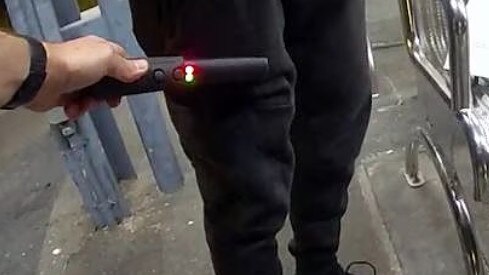NSW Police to gain greater powers to crackdown on knife crime after multiple high-profile incidents
NSW Police will be able to use new knife-crime laws to seize other illicit goods and substances such as drugs, the Premier has confirmed. The new powers have been driven by concerns about the safety of events such as the Easter Show.
NSW
Don't miss out on the headlines from NSW. Followed categories will be added to My News.
NSW Police will be able to use new knife-crime laws to seize other illicit goods and substances, Premier Chris Minns has confirmed.
Legislation was introduced to parliament on Wednesday to give police new powers to use metal-detecting “wands” to scan people for knives in public places where a knife crime or a “serious indictable offence involving violence” has occurred in the past year.
Police will be able to scan the public, without a warrant, in areas designated by a senior officer.
If the wands go off, people could be asked to turn out their pockets.
Illegal drugs or other illicit items could be seized if they are found, Mr Minns said.

“If you’ve got illicit drugs and it’s caught as a result of the wanding, or the scanning, by NSW Police, you will be charged,” he said.
Mr Minns would not be drawn on whether that was an “unintended consequence” or a “benefit” of the laws.
“This means that you’ve got more of a chance of being caught if you do have (illegal drugs),” he said.
If the metal detector wands detect other illegal goods, they can also be seized, he said.
Overnight the Daily Telegraph revealed fresh details of the new laws.
The final package, which was ticked off by cabinet on Monday night, extends the period when police can use proposed new wanding powers from six months to 12 months after an offence.
That is six months longer than originally intended.

The legislation is based on laws passed in Queensland following the stabbing death of 17-year-old Jack Beasley, who was on a night out in Surfers Paradise in 2019.
The new powers will allow police to use metal-detecting “wands” to scan members of the public without a warrant in certain locations, including public transport stations and vehicles, shopping centres, sporting venues and other public places.
The reforms come in the wake of a spate of Sydney stabbings including the horror Bondi Junction mass murder and the alleged stabbing of an Assyrian bishop in Wakeley.
A senior police officer — which the Telegraph can reveal will be of or above the rank of Assistant Commissioner — will first need to “declare” areas where new powers can operate.
Officers will be able to use the metal detecting wands for up to 12 hours following a designation.
An area will be able to be declared as a knife-wand search zone if certain offences have occurred there in the previous 12 months: at least one offence committed by a person armed with a knife or weapon, at least one serious indictable offence involving violence, or more than one knife or prohibited weapon offence.
Police will be able to stop anyone to conduct a metal-detecting scan and may require a person to produce any items detected.
The NSW laws have been designed to be slightly more flexible than Queensland legislation, which allows for metal detecting wands on public transport and so-called “safe night precincts”.
The NSW legislation also requires a police officer of a higher rank to make a declaration.
Extending the powers to anywhere where relevant crimes have occurred in the past year, rather than six months, will cover major yearly events such as the Easter Show.
In 2022, three teenagers were charged with murder after Uati “Pele” Faletolu was fatally stabbed at the Easter Show.
Under the proposed laws, that stabbing would have allowed police to use wanding powers at the Easter Show the following year; something which would not have been possible under the legislation passed in Queensland.
The Telegraph on Monday revealed that a teenage boy had a knife held to his throat at the Dubbo Show over the weekend, with a hoax “stab list” sending locals into panic.
Do you have a story for The Daily Telegraph? Message 0481 056 618 or email tips@dailytelegraph.com.au





